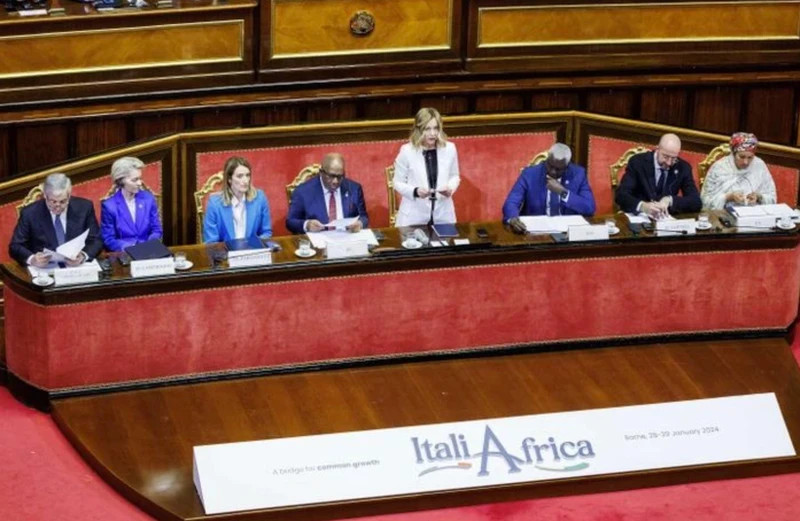Prime Minister Giorgia Meloni said, "Italy is making a "precise foreign policy choice, which will lead to giving Africa a place of honour on the agenda of our G7 presidency,".
The conference took place in Rome with the participation of Italian Prime Minister Giorgia Meloni, 25 African leaders, along with President of the European Commission Ursula von der Leyen, President of the European Council Charles Michel and President of the European Parliament Roberta Metsola.
The main policy pillars of the Mattei Plan that Italy proposed and discussed at the conference are education and training, agriculture, health, water and energy - issues that both continents are focusing on to promote cooperation.
Speaking at the conference, Prime Minister Meloni emphasised, "Italy, Europe, and the whole world cannot think about the future without taking Africa into due consideration. Our future inevitably depends on the future of the African continent. Being aware of this, we want to do our part,".
She also announced that the initial allocation of the Mattei Plan aimed at re-establishing Italy's relations with Africa, with an initial budget of more than 5.5 billion EUR in loans, grants and guarantees, with approximately 3 billion EUR allocated from the Italian Climate Fund.
Prime Minister Meloni's government will seek support from the private sector and international organisations, such as the European Union (EU).
The fact that Italy is a bridge between Africa and Europe is built from the solid foundations that the founder of state-owned oil and gas corporation Eni, Mr. Enrico Mattei, laid down in the 1950s.
The Italian Prime Minister wishes to write a new chapter in the history of relations and cooperation between equal partners of Italy, Europe and Africa.
As one of the front-line countries suffering from the negative impacts of the wave of migrants from Africa, Italy wants to coordinate with countries on the two continents to thoroughly solve this problem by helping Africa create jobs and improve people's lives through development projects.
To promote Europe's support for Africa, contributing to realising development goals on the continent, the Mattei Plan proposed by Italy addressed a series of important pillars.
With the "education and training" pillar, this plan will introduce interventions to promote training, adjust curricula, launch new training and professional courses suitable to the needs of the labour market, and cooperate with businesses, especially with the participation of Italian businesses.
Promoting development in Africa is one of the priorities given by Prime Minister Meloni in the context of Italy taking over the rotating presidency of the G7, which is a central theme of the G7.
Support measures in agriculture aim to promote the development of agricultural and food supply chains and support the development of non-fossil biofuels.
The Mattei Plan will also dedicate a specific section to health. The plan will focus on strengthening health systems, improving local capacity in terms of management, training and employment in health care systems, developing prevention strategies and systems, and preventing health threats, especially pandemics and natural disasters.
The last, but certainly not the least important, pillar of the Mattei Plan is the climate-energy nexus and related infrastructure. The goal is to turn Italy into an energy centre, a real bridge between Europe and Africa.
Italy is also committed to the local development of energy-related technologies through the establishment of energy innovation centres, where Italian companies will be able to select local startups, thereby supporting employment and human resource development.
Water scarcity in Africa is one of the main factors linked to food insecurity, conflict and migration. Therefore, ensuring a clean water supply for people in the continent also needs support from European countries.
Within the framework of this initiative, support measures will involve maintaining existing water supply points, investing in distribution networks, and raising awareness through activities related to clean water use.
All of these pillars are interconnected by infrastructure initiatives that are both general and specific to each field.
Promoting development in Africa is one of the priorities given by Prime Minister Meloni in the context of Italy taking over the rotating presidency of the G7, which is a central theme of the G7.
Supporting Africa's economic development and improving the living standards of the continent's people will contribute to stopping the wave of migration to Europe for the common benefit of both continents.
















